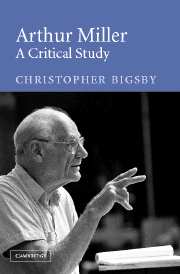Book contents
- Frontmatter
- Contents
- Acknowledgements
- Note on the text
- Introduction
- 1 The Michigan plays
- 2 The Golden Years, The Half-Bridge, Boro Hall Nocturne
- 3 The radio plays
- 4 The Man Who Had All the Luck
- 5 Focus
- 6 All My Sons
- 7 Death of a Salesman
- 8 Arthur Miller: time-traveller
- 9 An Enemy of the People
- 10 The Crucible
- 11 A Memory of Two Mondays
- 12 A View from the Bridge
- 13 Tragedy
- 14 The Misfits
- 15 After the Fall
- 16 Incident at Vichy
- 17 The Price
- 18 The Creation of the World and Other Business
- 19 The Archbishop's Ceiling
- 20 Playing for Time
- 21 The shearing point
- 22 The American Clock
- 23 The one-act plays: Two-Way Mirror, and Danger: Memory!
- 24 The Ride Down Mount Morgan
- 25 The Last Yankee
- 26 Broken Glass
- 27 Mr Peters' Connections
- 28 Resurrection Blues
- 29 Finishing the Picture
- 30 Fiction
- 31 Arthur Miller as a Jewish writer
- Notes
- Index
2 - The Golden Years, The Half-Bridge, Boro Hall Nocturne
Published online by Cambridge University Press: 16 November 2009
- Frontmatter
- Contents
- Acknowledgements
- Note on the text
- Introduction
- 1 The Michigan plays
- 2 The Golden Years, The Half-Bridge, Boro Hall Nocturne
- 3 The radio plays
- 4 The Man Who Had All the Luck
- 5 Focus
- 6 All My Sons
- 7 Death of a Salesman
- 8 Arthur Miller: time-traveller
- 9 An Enemy of the People
- 10 The Crucible
- 11 A Memory of Two Mondays
- 12 A View from the Bridge
- 13 Tragedy
- 14 The Misfits
- 15 After the Fall
- 16 Incident at Vichy
- 17 The Price
- 18 The Creation of the World and Other Business
- 19 The Archbishop's Ceiling
- 20 Playing for Time
- 21 The shearing point
- 22 The American Clock
- 23 The one-act plays: Two-Way Mirror, and Danger: Memory!
- 24 The Ride Down Mount Morgan
- 25 The Last Yankee
- 26 Broken Glass
- 27 Mr Peters' Connections
- 28 Resurrection Blues
- 29 Finishing the Picture
- 30 Fiction
- 31 Arthur Miller as a Jewish writer
- Notes
- Index
Summary
The Golden Years, written between 1939 and 1941, about the conquest of Mexico by Cortes and his conquistadors and the overthrow of Montezuma, Emperor of the Aztecs, was Miller's displaced reaction to events in Europe in the late 1930s. Though set in the past, it was his attempt to understand the political and moral paralysis of the Western powers in the face of fascist aggression. Initially written for the Federal Theatre, it was submitted to the Theatre Guild and the Group Theatre in whose hands it languished. When it eventually surfaced it seemed, to Miller, that it no longer fitted the trajectory of his career and was sent, with a pile of other material, to the Harry Ransom Center at the University of Texas as part of a deal that would help him pay off the taxes he owed following the collapse of his marriage to Marilyn Monroe in 1962.
It was a play whose twenty-five speaking parts, and, ideally, a number of non-speaking ones, including ‘the whole Aztec Army’, would have caused no problems for the Federal Theatre, but made it an unlikely project for any other and, indeed, half a century later it only reached the stage by way of radio and television.
The Golden Years comes as something of a surprise after the earnest politics and sturdy realism of his first plays, though he had tried rewriting The Great Disobedience in verse.
- Type
- Chapter
- Information
- Arthur MillerA Critical Study, pp. 27 - 39Publisher: Cambridge University PressPrint publication year: 2004



